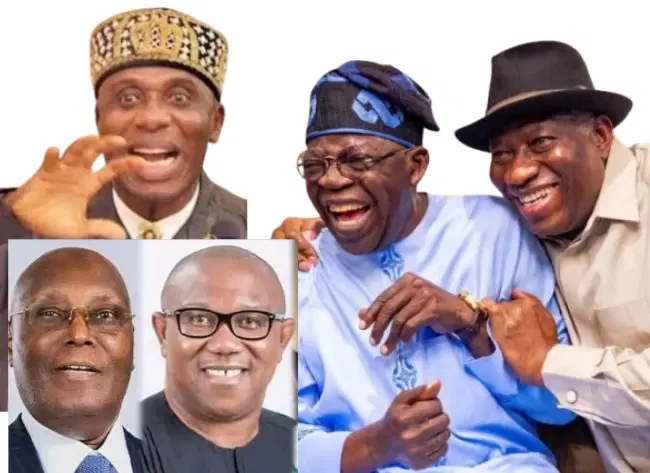Breaking News
How Opposition Disunity Could Hand Tinubu a Clear Path to 2027 Victory
Initially seen as a platform to unite opposition forces, the African Democratic Congress (ADC) has instead become riddled with infighting, with several heavyweights vying for control of the party’s presidential ticket.

As Nigeria edges closer to the 2027 general elections, early political calculations suggest that President Bola Ahmed Tinubu may have a smoother path to re-election—not necessarily because of his strategies or performance, but due to deepening divisions within the opposition.
Despite running a turbulent campaign in 2023, Tinubu emerged victorious and now benefits from the power of incumbency. However, his biggest advantage heading into the next election may come from the fractured state of opposition politics, particularly within the Peoples Democratic Party (PDP), Labour Party (LP), and the coalition-backed African Democratic Congress (ADC).
Fragmentation Echoes 2023 Scenario
The current state of affairs mirrors the 2023 election landscape, where multiple opposition candidates split the vote, ultimately making it easier for Tinubu to secure the presidency. If the opposition fails to unify ahead of 2027, history could repeat itself—with even less resistance.
Political analysts argue that unless opposition figures form a cohesive alliance, the election may be decided before a single vote is cast.
Internal Power Struggles in ADC
Initially seen as a platform to unite opposition forces, the African Democratic Congress (ADC) has instead become riddled with infighting, with several heavyweights vying for control of the party’s presidential ticket.
- Atiku Abubakar, Peter Obi, and Rotimi Amaechi are all linked to the party, but rather than forming a unified front, their parallel ambitions are fueling fresh rivalries.
Atiku’s Silent Takeover
Though yet to formally declare his candidacy, former Vice President Atiku Abubakar is believed to be quietly consolidating power within the ADC. His loyalists now occupy key positions in the National Working Committee, Board of Trustees, and several state chapters.
While showcasing Atiku’s political savvy, this behind-the-scenes dominance has stirred discontent among other aspirants. Many fear the coalition is being skewed in his favor even before primaries begin, potentially discouraging broader participation.
Obi’s Strained Alliance
Peter Obi initially joined the ADC coalition to expand his base beyond the Labour Party, but internal conflicts have cast doubt on that strategy. A leaked memo from his Obidient Movement accused ADC leaders of sidelining Obi and his supporters in major decisions.
While Obi remains a powerful force in opposition politics, the increasingly tense relationship between him and ADC leadership threatens his chances of clinching the party’s ticket—or building the national coalition needed to challenge the APC.
Amaechi’s Bold Declaration
Unlike Atiku and Obi, Rotimi Amaechi has taken a more direct approach. In a recent X Space session, he confidently declared:
“I know Tinubu very well. I know his strengths. I know his weaknesses. And I know that if allowed to fly the flag of ADC, I will defeat Tinubu for sure.”
However, without forging strategic alliances with Atiku or Obi, Amaechi’s lone-wolf strategy may fall short in mobilizing widespread opposition support.
PDP’s Countermoves and Jonathan Factor
As ADC figures battle for dominance, the PDP is quietly working on its own realignments. The party’s Governors’ Forum Chair, Bala Mohammed, recently hinted at efforts to woo Obi back into the PDP fold.
However, some PDP heavyweights remain skeptical of Obi’s one-term presidency promise, instead floating former President Goodluck Jonathan as a more viable alternative.
“The North would prefer Jonathan to Obi,” said Umar Sani, a PDP chieftain. “Obi’s four-year pledge is just political talk.”
This sentiment reflects broader doubts within the party about Obi’s credibility and staying power, potentially complicating any attempt at reconciliation.
Risk of a Split Vote in 2027
With Atiku, Obi, Amaechi, and other contenders eyeing the same opposition base, the risk of a split vote in 2027 is substantial. And if each candidate continues on a separate path, the ruling All Progressives Congress (APC) and Tinubu may once again benefit from opposition disunity.
“Unity among his rivals is the only real threat,” one analyst noted. “Their division could well be his ticket to a second term.”
A Narrowing Window
While the opposition still has time to close ranks and build a unified strategy, the clock is ticking. The longer these internal battles persist, the clearer Tinubu’s path to re-election becomes.
In Nigerian politics, 24 hours can change everything—but as it stands, the biggest gift the opposition could give Tinubu in 2027 is staying divided.









